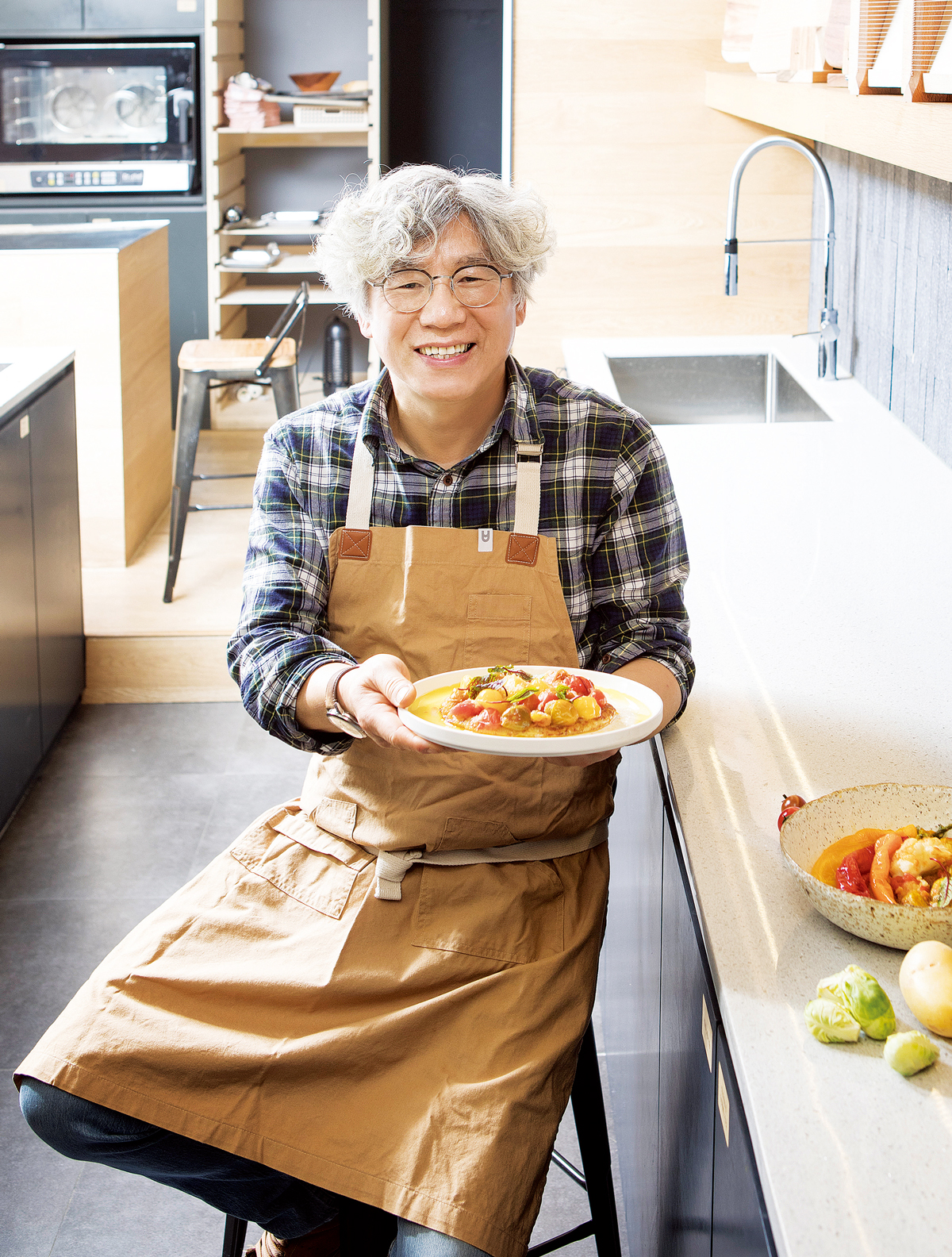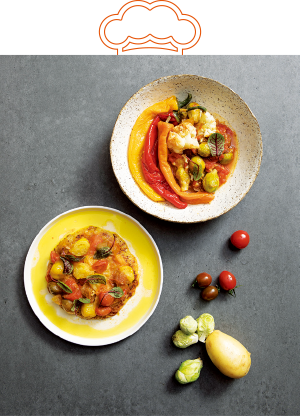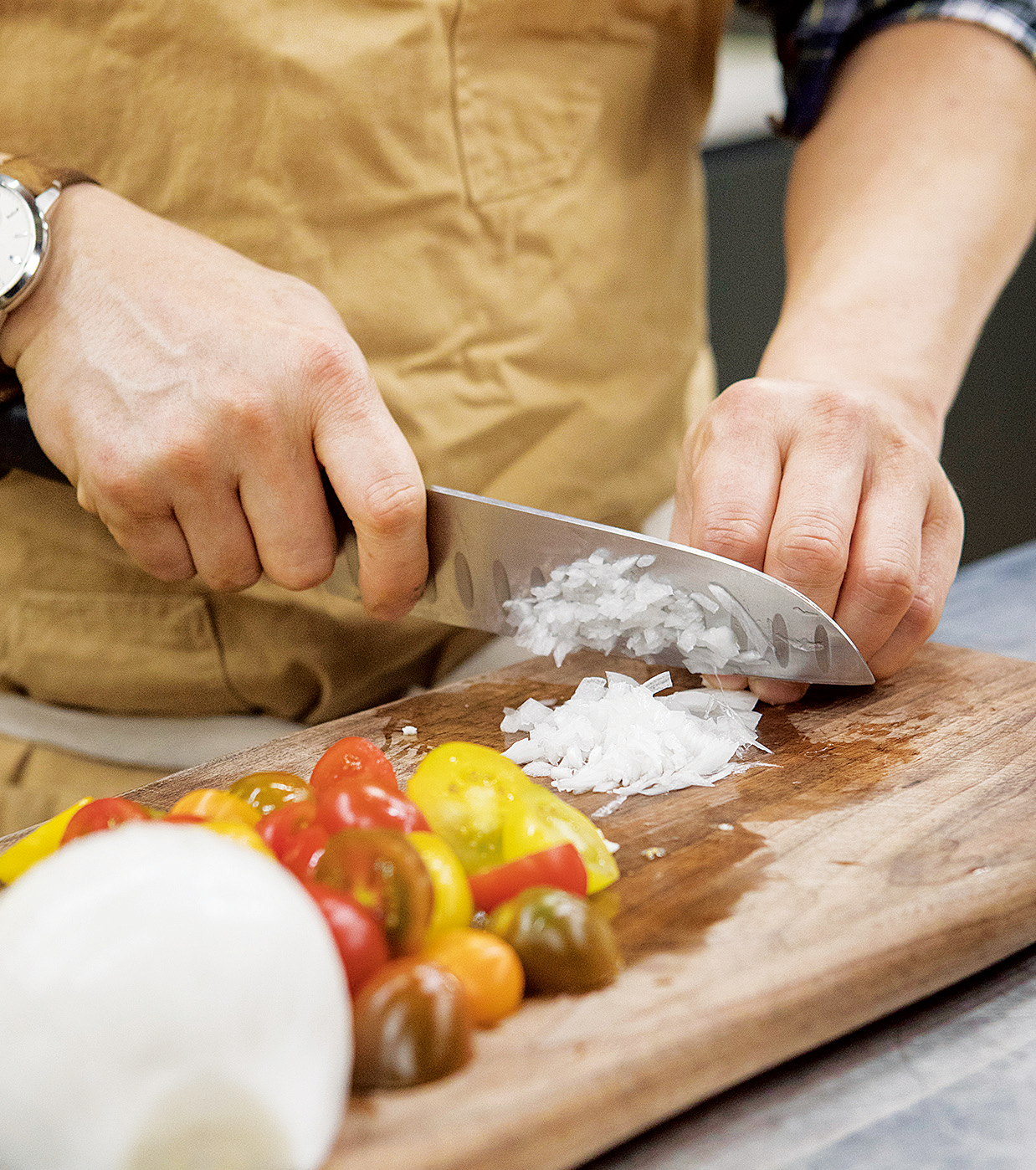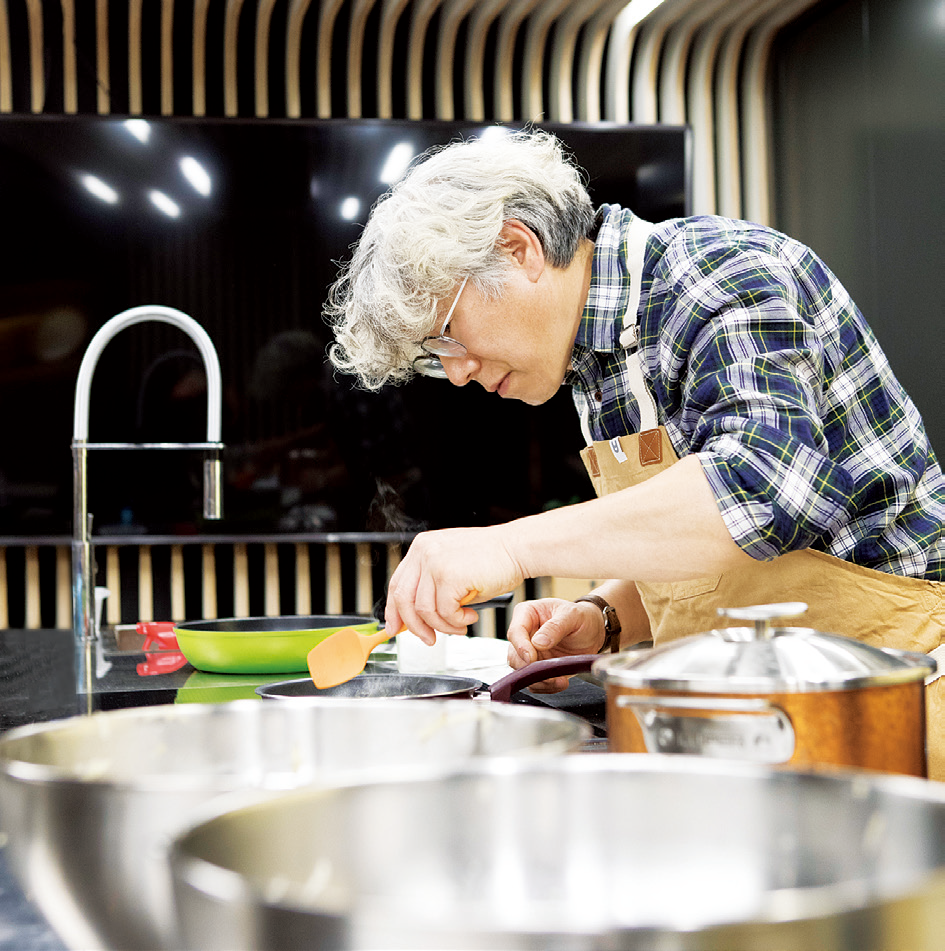-
 2023. April VOL. 661
2023. April VOL. 661


Food served at restaurants or sold at stores tend to seek strong flavors so as to please customers’ palates, while we are getting used to factory-processed food that is sold mainly at convenient stores and fast-food restaurants. It is becoming increasingly difficult to find ‘natural’ food on our dining tables. Chef Oh-jin Kwon, who specializes in natural vegan recipes proposes healthy food that keeps ingredients as natural as possible. He says cooking is not only about the ‘taste’, but we should also think about health and environment as we cook and eat food.
“People think vegan food is not tasty enough. Actually, every ingredient has its own unique taste. Vegan food can be as good as any common food if it is cooked properly based on an understanding of ingredients and if you discover the unique taste of each ingredient.”
Chef Kwon was not interested in natural cooking in the early years of his career. He was building his career working as a chef at renowned Korean and international hotels. One day, however, he started to realize that something was missing in his cooking, and felt a growing sense of futility.
“When I cooked at a hotel restaurant, I used all kinds of condiments and seasonings. Actually, condiments and seasonings are needed when the main ingredients are not good enough to create the desired flavors. They can even mask the authentic flavors of the ingredients. I was cooking food that could satisfy people’s palates momentarily at every bite taken. But I thought there should be more to my cooking than simply pleasing people’s palates.”
So, he left the hotel restaurant when he was about to get promoted, doing so with only one goal of cooking food that retains the natural flavors of ingredients. That’s why he started the weekend farm ‘Le Closeau’ which means ‘a small vegetable garden’ in French.
At Le Closeau, chef Kwon depends solely on nature as he grows vegetables and fruit, which he uses to develop vegan recipes. On his farm, a variety of Korean and foreign vegetables are grown, including artichokes, traditional Korean persimmons, Indian potatoes, white carrots, golden berries, etc.
“In the past, people in rural villages grew their own vegetables and fruit in their garden. Considering that they didn’t grow them to sell, and usually cooked food with the vegetables for their own family, they devoted the time and earnest effort. That’s the spirit we follow here at Le Closeau. We are free from the pressure and constraints of speed and volume. Instead, we faithfully follow and embrace all the changes each season brings. When you wait until they are fully ripe, the ingredients fully evoke their unique natural flavors.”

Chef Kwon is adamant about preserving the natural shapes of ingredients and keeping the cooking process simple. He believes cooking can be as simple as just removing toxins and adding salt or pepper to taste. He says meat-heavy meals today provide more nutrition than we need, which is probably a hallmark of gluttony.
Veganism refers to a lifestyle of not consuming animal-derived products and avoiding meats. It is a broad concept that includes all the animals living on Earth as opposed to a human-centric way of thinking.
“Nature and humans need to create a virtuous cycle. When we practice veganism to respect and protect nature, the Earth offers us great ingredients to eat. And we no longer take what we eat for granted. Instead, we are thankful for what nature has to offer. Good food should make us healthy. I think veganism is ‘reciprocity’ between humans and the Earth.”
He advises you to go out to farms and fields, and learn about natural ingredients being cultivated, if you are interested in veganism. You can embark on your own veganism by learning small things about vegetables with your sight and touch. You can ‘watch how they grow’, ‘look at their beautiful colors, and feel them with your own hands’. You may find vegan recipes quite strange at first, but will soon realize healthy food tastes great, too.
“Above all, you should use ingredients that are in season. Vegetables in season tend to absorb water, which makes their taste mild. If you cook these vegetables, they will likely get too soft and mushy. They taste better when eaten crisp and fresh as in a salad. I recommend you use spring onions to make a salad, kimchi or pickles.”
Chef Kwon cooked ‘tall bell peppers and vegetable glace’, and ‘garden hash brown potatoes and tomato coulis’ for us, and he used potatoes grown himself in his garden, with only salt, sugar and vegan butter to taste. The food tasted mild and light, which reminded me of chef Kwon’s lifestyle of loving nature and living a simple and honest life.


Stressing the importance of environmental preservation and management, chef Kwon warns we should not do things that may harm nature if we want to be healthy. If we keep wasting resources and destroying the environment, in the belief that there is no imminent threat to us, we will end up destroying ourselves eventually.
“Our physical health is directly related to the health of the Earth. If ingredients were grown in polluted air and water, how can they possibly be healthy? It is no different from eating concentrated pollutants, which we put in our mouth and body. And this is a big problem.”
Asked about his future plans, he said he wanted to run a big farm and kitchen, and share with others the entire process of how ingredients are grown and used to cook food served on our table.
“I want to create a healing course of sorts. The course participants will be able to watch vegetables and crops grow, harvest them and cook their own food with these ingredients. It will allow both adults and children to create their own world of cooking. I want them to discover how amazing and great Mother Nature is and what it can do for us as they cook in nature. I honestly hope I can share this joy and happiness that nature has given me with as many people as possible.”